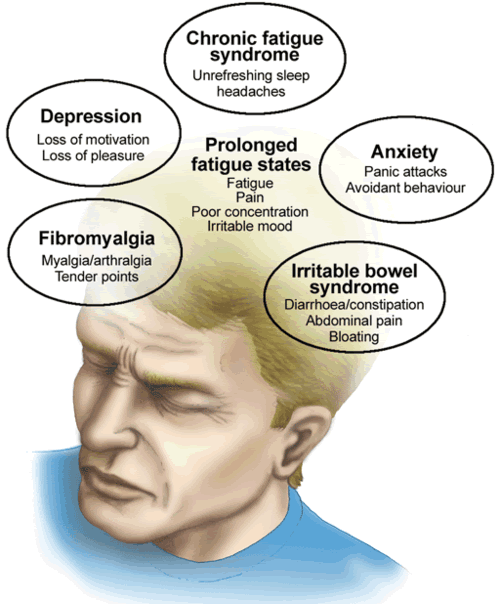Fatigue
Chronic Fatigue Syndrome
Chronic fatigue syndrome (CFS), is a disorder characterized by profound fatigue that does not improve with bed rest and which be worsened by physical or mental activity.
CFS, is a complex debilitating disorder which results in people often functioning at a lower level of activity than they were capable of before they became ill.
Researchers have not yet identified a clear cause of CFS.
CFS may be caused by a combination of factors which include

- Viral infections.Some people develop chronic fatigue syndrome after having a viral infection,
- Immune system problems. The immune systems of people CFS have been shown to be slightly impaired.
- Hormonal imbalances. Some people with CFS have been shown to experience abnormal blood levels of hormones produced in the hypothalamus, pituitary gland or adrenal glands in response to stress
- Nutritional deficiency
Because many illnesses have fatigue as a symptom, we need to rule out other conditions, which may be treatable.
These may include:
- Sleep disorders. Chronic fatigue can be caused by sleep disorders such as obstructive sleep apnea, restless leg syndrome or insomnia which can be indentified by a sleep study.
- Medical problems. Fatigue is a common symptom in several medical conditions, such as anemia, diabetes and underactive thyroid (hypothyroidism). Lab tests can check your blood for evidence of some of the top suspects.
- Mental health issues. Fatigue is also a symptom of a variety of mental health problems, such as depression, anxiety, bipolar disorder and schizophrenia. A psychiatrist can help determine if one of these problems is causing your fatigue.
Treatment of CFS can be complex. There are no specific medicines for treatment is CFS especially as symptoms can vary a lot over time. Close monitoring and treatment of symptoms with strategies that change as the pattern of the disorder pattern changes.
A team approach that involves doctors and patients is one key to managing CFS. Patients benefit when they can work in collaboration with a team of doctors who might include a psychiatrist, a rehabilitation specialist, and physical or exercise therapists. Together, they can create an individualized treatment program that best meets the needs of the patient with CFS. This program should be based on a combination of therapies that address symptoms, coping techniques, and managing normal daily activities.
Psychological counseling. Talking with a counselor can help you figure out options to work around some of the limitations that chronic fatigue syndrome imposes on you. Feeling more in control of your life can improve your outlook dramatically.
Symptome:
- Fatigue which is not due to ongoing exertion or other medical conditions associated with fatigue and which significantly interferes with daily activities and work
The followong symptoms that appeared and persisted after onset of the fatigue.
- post-exertion malaise lasting more than 24 hours
- Severe recurring sore throat
- Loss of memory or concentration
- Unexplained muscle pain
- Pain that moves from one joint to another without swelling or redness
- Headache of a new type, pattern or severity
- Unrefreshing sleep
- tender lymph nodes in the neck or armpit
Unidentifies and untreated CFS may result in :
- Depression
- Social isolation
- Lifestyle restrictions
- Increased work absences
Diagnosis can only be made after ruling out other possible illnesses. A detailed patient history is followed by a thorough physical and mental health exam and a series of laboratory screening tests to help identify or rule out other possible causes of symptoms. There may also be additional tests.
Medications
- Antidepressants. Many people who have chronic fatigue syndrome are also depressed. Treating depression can make it easier for the person to cope with the problems associated with chronic fatigue syndrome. And low doses of some antidepressants also can help improve sleep and relieve pain.
- Sleeping pills. These may be prescribed If home measure don’t work
Other Therapies:
- Graded exercise. A physical therapist can help determine what types of exercise are best. Inactive people often begin with range-of-motion and stretching exercises for just a few minutes a day. If you’re exhausted the next day, you’re doing too much. Your strength and endurance will improve as you gradually increase the intensity of your exercise over time.
